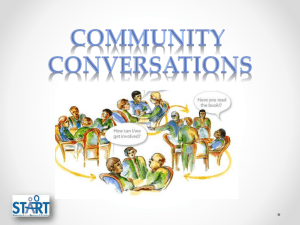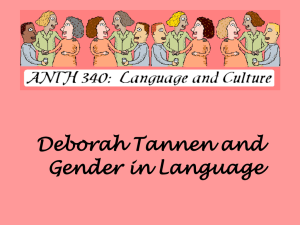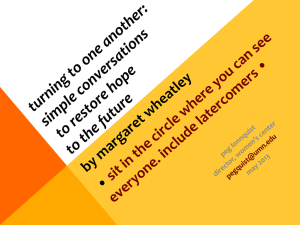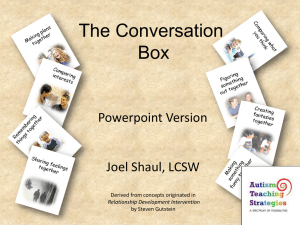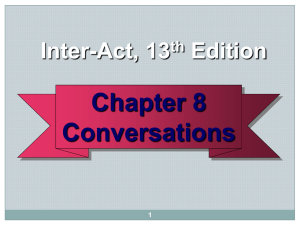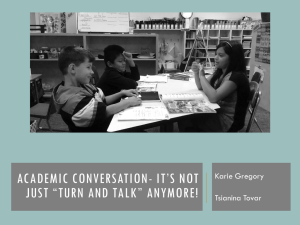Communication and Conflict Management
advertisement
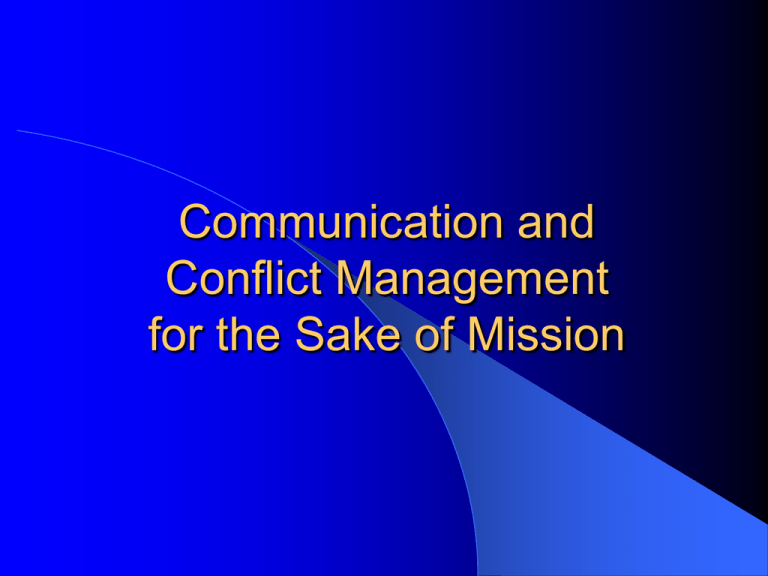
Communication and Conflict Management for the Sake of Mission What is the purpose of life? What is the meaning of success? What is the measure of a life well lived? Did I reach my life goals? What was my life about? Have past issues been resolved? Leadership Identity Questions Have I lived my life with integrity? Who am I? What is the meaning and purpose of life? What is happiness? Who are we? What do we do? Why do we do it? For whom do we do it? How did my life matter? Was my time well spent? What did I mean to others? How can I get my needs met without being selfish? What can I look back on with pride? Did I love well? Collaboration is the identification, release and union of all the gifts in ministry for the sake of mission. Sofield and Juliano Conversation Good conversation connects us at a deeper level. As we share our different human experiences, we rediscover a sense of unity. We remember we are part of a greater whole. And as an added joy, we also discover our collective wisdom. Suddenly we see how wise we can be together. Margaret Wheatley Reflection What are the hallmarks of a good conversation for you? – What does a good conversation “look” like? What feelings do you experience when you have a good conversation? – What does a good conversation “feel” like? What are some of the outcomes of a good conversation for you? Reflection Take a minute to think about a good conversation you have had recently that reflects some of Wheatley’s ideas. – What was it about your behavior and attitude that helped you connect? – What was it about the other person’s behavior and attitude that facilitated the ease of your conversation? Principles of Conversation Margaret Wheatley We acknowledge one We slow down so we another as equals have time to think and reflect We try to stay curious about each We remember that other conversation is the natural way humans We recognize that we think together need each other’s help to become better We expect it to be listeners messy at times. Conversation Conversation is a meeting of minds with different memories and dreams. When minds meet, they don’t just exchange ideas, they transform them, reshape them, draw different implications from them, engage in new trains of thought. Conversation doesn’t just reshuffle the cards, it creates new cards. Theodore Zeldin Are you willing to be influenced by the conversations you have? Disturbed Excited Surprised Curious Willing to receive what the other says Willing to respect diversity Willing to challenge in order to understand and not to convert the other to our way of thinking Willing to yield to new ideas Reflection What helps you to keep an open mind as you converse with someone? What keeps you willing to be “influenced” by what another person is saying? One of the ways in which we build a human society is by recovering a reverence for words and their potency to form and sustain community. Timothy Radcliffe, OP Speaking is not just about words Speaking is a moral act, demanding the deepest responsibility. Timothy Radcliffe, OP We have lost St. Augustine’s sense of awe when he says, “Words, those precious cups of meaning.” Timothy Radcliffe, OP Reflection Think about some conversations you have had recently. – Have there been times when words created problems for you? – What happened? Conversation: Art & Discipline Art Discipline Creative side: birth of relationship Nourishing Enlighten decisionmaking Connect people at the center of energy Learning Understanding Desire to know more Application of what we learn Reflection How do you foster the “artistic” dimension of conversation? How do you foster the “discipline” side of conversations as you engage with others? Government Structure Governance Interrelationships within levels of governance Spirituality Ongoing Spiritual formation Operating Principles Mission Resources Local Communities Committees Ministry Each of us is a word of God spoken only once. Each member of a community is unique. Sofield, Hammett, Juliano Reflection What strikes you as you reflect on this statement? What are the implications of this statement for us as we relate with others? What do your congregation’s documents say about the uniqueness or importance of each person? – How does this influence the manner in which you engage with others?

